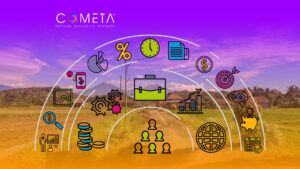When should we worry about conducting a results-based evaluation? For COMETA, the best moment is when civil society organizations (CSOs) want to understand their achievements in detail or want to give the stakeholders and donors evidence of their results. Also, when we want to share our progress with the stakeholders and the public. If we have one of these goals, we should request a results-based evaluation or an impact assessment.
What does “to measure the impact” mean?
We commonly believe that an impact assessment can provide us with uncontested evidence about our intervention’s impact; in other words, the confirmation that we achieved the desired change due to our plans and strategies. However, this is hard to prove because we intervene in an environment where many elements can contribute to change and are unrelated to our work. Identifying our specific contribution is possible, but we require evaluation methodologies that isolate the components contributing to the result. This could strain time and resources because we need to collect information we don’t necessarily have. We also require specialized knowledge in evaluation. Therefore, civil society organizations conduct results-based evaluations. The difference is that evaluations focus on our results based on our Theory of Change, not our “real” impact.
We might not be able to conduct a real impact assessment. However, this should not discourage us. We can perform a results-based evaluation even though we cannot ensure that changes are entirely due to our interventions.
What can we expect from a results-based evaluation?
The evaluation we do about our work is very relevant because it helps us to analyze:
- If we achieved our goals.
- What are the most useful strategies and activities?
- How do we use our resources?
In addition to the evidence obtained from an evaluation, its results are a very useful learning tool that allows us to document our experiences. If we go further and conduct results-based evaluations periodically, we will have historical information and evidence to prove the effectiveness and efficiency of our work.
How should an evaluation be conducted?
It is important to ensure that our evaluations have methodological sharpness and provide valuable feedback.
Key questions
In an impact assessment process, we need to identify the key questions. For example:
- Are we getting closer to our institutional goals?
- What are our concrete achievements linked to those goals?
- Which strategies or activities explain our achievements?
- What actions or strategies did we stop doing?
- Did that impact our results?
- What resources have we used to carry out these strategies and activities?
Methodology design
The evaluation process must be clear and leave well-grounded expectations addressing the following questions:
- What research tools are we going to use to collect required information?
- What are the research primary and secondary sources?
- What are the methods to collect, synthesize and analyze information?
- What are the evaluation´s methods?
- When are we going to have the evaluation´s results?
It is important to be strategic
Results-based evaluation should have realistic goals and be designed based on available information and our capabilities and resources. It is worthless to design a comprehensive evaluation if it will be difficult to collect enough information or if it will be time consuming. A cumbersome evaluation could distract us from our key activities and make us lose track of the evaluation’s goal.
It is much better to pose few research questions that could bring valuable information. Also, it is crucial to get solid results and significant insights to improve our strategies and activities. Therefore, we can set strategic goals reflecting improvements in our work to reach our institutional mission.
COMETA’s reflection.
Walking towards our organizational goals should be a process where we define a roadmap and take a break to assess our journey and share our progress with all stakeholders to move ahead with confidence. This tool is a great opportunity to rethink our strategies and imagine how to make the impact we want.
Do you already assess your impact? How often do you conduct a results-based evaluation? Do you know how to measure your results? Remember that COMETA can walk you through this process.





